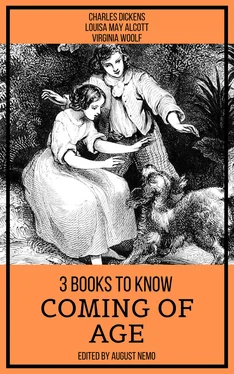Exactly what I myself had thought, many times. Exactly what was perfectly manifest to me at the moment. But how could I, a poor dazed village lad, avoid that wonderful inconsistency into which the best and wisest of men fall every day?
"It may be all quite true," said I to Biddy, "but I admire her dreadfully."
In short, I turned over on my face when I came to that, and got a good grasp on the hair on each side of my head, and wrenched it well. All the while knowing the madness of my heart to be so very mad and misplaced, that I was quite conscious it would have served my face right, if I had lifted it up by my hair, and knocked it against the pebbles as a punishment for belonging to such an idiot.
Biddy was the wisest of girls, and she tried to reason no more with me. She put her hand, which was a comfortable hand though roughened by work, upon my hands, one after another, and gently took them out of my hair. Then she softly patted my shoulder in a soothing way, while with my face upon my sleeve I cried a little—exactly as I had done in the brewery yard—and felt vaguely convinced that I was very much ill-used by somebody, or by everybody; I can't say which.
"I am glad of one thing," said Biddy, "and that is, that you have felt you could give me your confidence, Pip. And I am glad of another thing, and that is, that of course you know you may depend upon my keeping it and always so far deserving it. If your first teacher (dear! such a poor one, and so much in need of being taught herself!) had been your teacher at the present time, she thinks she knows what lesson she would set. But It would be a hard one to learn, and you have got beyond her, and it's of no use now." So, with a quiet sigh for me, Biddy rose from the bank, and said, with a fresh and pleasant change of voice, "Shall we walk a little further, or go home?"
"Biddy," I cried, getting up, putting my arm round her neck, and giving her a kiss, "I shall always tell you everything."
"Till you're a gentleman," said Biddy.
"You know I never shall be, so that's always. Not that I have any occasion to tell you anything, for you know everything I know—as I told you at home the other night."
"Ah!" said Biddy, quite in a whisper, as she looked away at the ships. And then repeated, with her former pleasant change; "shall we walk a little further, or go home?"
I said to Biddy we would walk a little further, and we did so, and the summer afternoon toned down into the summer evening, and it was very beautiful. I began to consider whether I was not more naturally and wholesomely situated, after all, in these circumstances, than playing beggar my neighbour by candlelight in the room with the stopped clocks, and being despised by Estella. I thought it would be very good for me if I could get her out of my head, with all the rest of those remembrances and fancies, and could go to work determined to relish what I had to do, and stick to it, and make the best of it. I asked myself the question whether I did not surely know that if Estella were beside me at that moment instead of Biddy, she would make me miserable? I was obliged to admit that I did know it for a certainty, and I said to myself, "Pip, what a fool you are!"
We talked a good deal as we walked, and all that Biddy said seemed right. Biddy was never insulting, or capricious, or Biddy to-day and somebody else to-morrow; she would have derived only pain, and no pleasure, from giving me pain; she would far rather have wounded her own breast than mine. How could it be, then, that I did not like her much the better of the two?
"Biddy," said I, when we were walking homeward, "I wish you could put me right."
"I wish I could!" said Biddy.
"If I could only get myself to fall in love with you—you don't mind my speaking so openly to such an old acquaintance?"
"Oh dear, not at all!" said Biddy. "Don't mind me."
"If I could only get myself to do it, that would be the thing for me."
"But you never will, you see," said Biddy.
It did not appear quite so unlikely to me that evening, as it would have done if we had discussed it a few hours before. I therefore observed I was not quite sure of that. But Biddy said she was, and she said it decisively. In my heart I believed her to be right; and yet I took it rather ill, too, that she should be so positive on the point.
When we came near the churchyard, we had to cross an embankment, and get over a stile near a sluice gate. There started up, from the gate, or from the rushes, or from the ooze (which was quite in his stagnant way), Old Orlick.
"Halloa!" he growled, "where are you two going?"
"Where should we be going, but home?"
"Well then," said he, "I'm jiggered if I don't see you home!"
This penalty of being jiggered was a favourite supposititious case of his. He attached no definite meaning to the word that I am aware of, but used it, like his own pretended Christian name, to affront mankind, and convey an idea of something savagely damaging. When I was younger, I had had a general belief that if he had jiggered me personally, he would have done it with a sharp and twisted hook.
Biddy was much against his going with us, and said to me in a whisper, "Don't let him come; I don't like him." As I did not like him either, I took the liberty of saying that we thanked him, but we didn't want seeing home. He received that piece of information with a yell of laughter, and dropped back, but came slouching after us at a little distance.
Curious to know whether Biddy suspected him of having had a hand in that murderous attack of which my sister had never been able to give any account, I asked her why she did not like him.
"Oh!" she replied, glancing over her shoulder as he slouched after us, "because I—I am afraid he likes me."
"Did he ever tell you he liked you?" I asked, indignantly.
"No," said Biddy, glancing over her shoulder again, "he never told me so; but he dances at me, whenever he can catch my eye."
However novel and peculiar this testimony of attachment, I did not doubt the accuracy of the interpretation. I was very hot indeed upon Old Orlick's daring to admire her; as hot as if it were an outrage on myself.
"But it makes no difference to you, you know," said Biddy, calmly.
"No, Biddy, it makes no difference to me; only I don't like it; I don't approve of it."
"Nor I neither," said Biddy. "Though that makes no difference to you."
"Exactly," said I; "but I must tell you I should have no opinion of you, Biddy, if he danced at you with your own consent."
I kept an eye on Orlick after that night, and, whenever circumstances were favourable to his dancing at Biddy, got before him, to obscure that demonstration. He had struck root in Joe's establishment, by reason of my sister's sudden fancy for him, or I should have tried to get him dismissed. He quite understood and reciprocated my good intentions, as I had reason to know thereafter.
And now, because my mind was not confused enough before, I complicated its confusion fifty thousand-fold, by having states and seasons when I was clear that Biddy was immeasurably better than Estella, and that the plain honest working life to which I was born, had nothing in it to be ashamed of, but offered me sufficient means of self-respect and happiness. At those times, I would decide conclusively that my disaffection to dear old Joe and the forge, was gone, and that I was growing up in a fair way to be partners with Joe and to keep company with Biddy—when all in a moment some confounding remembrance of the Havisham days would fall upon me, like a destructive missile, and scatter my wits again. Scattered wits take a long time picking up; and often, before I had got them well together, they would be dispersed in all directions by one stray thought, that perhaps after all Miss Havisham was going to make my fortune when my time was out.
Читать дальше












